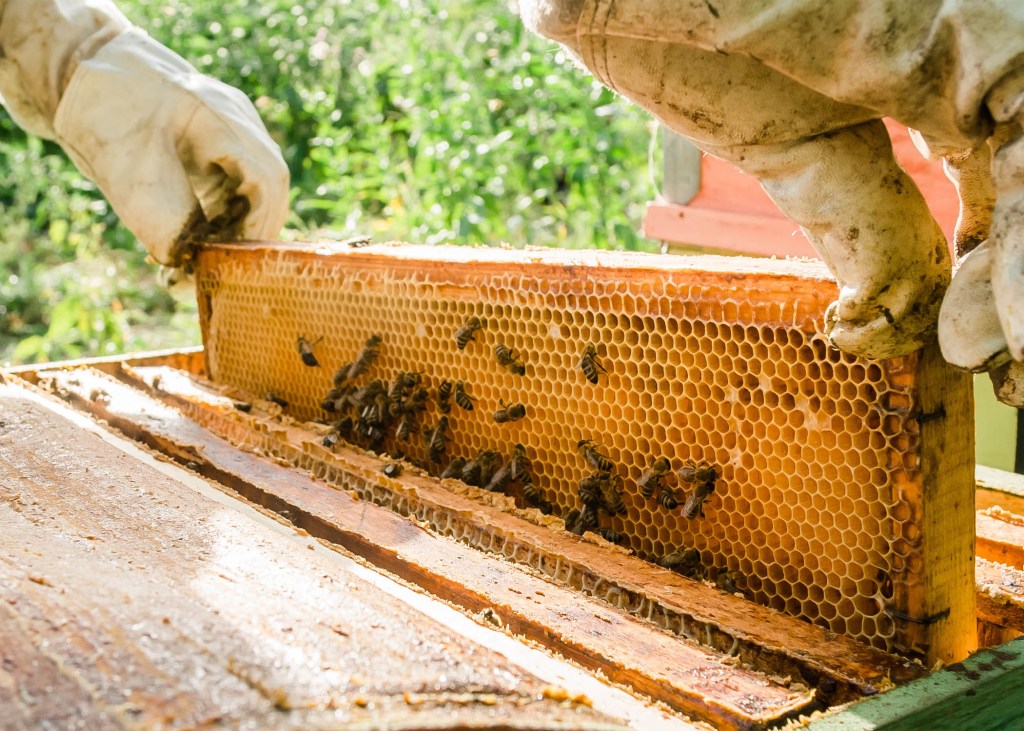Africanized honey bees not established in Mississippi
Published 7:04 am Friday, June 27, 2025

- Mississippi State University Extension Service bee specialist Jeff Harris said he has no evidence that Africanized honey bees are established in Mississippi. (Photo by Adobe stock) Alt text: A pair of hands pulls honeybees out of a hive.
By Susan Collins-Smith
MSU Extension Service
A Mississippi State University expert says he has no evidence that Africanized honey bees are established in Mississippi, contrary to reports from Mississippi media outlets on June 26.
Jeff Harris, bee specialist with the MSU Extension Service, immediately responded to a printed news article and subsequent media reports and social media posts that incorrectly announced the bees, commonly called killer bees, were found in the state.
“I have been a beekeeping specialist at MSU since 2012. There has only been one confirmed identification of Africanized honey bees in our state during the last 13 years. It was a colony found in Pass Christian, and it likely arrived via shipping at a port near the home where it was found. The bees were destroyed by the Bureau of Plant Industry,” Harris said.
“They [the Bureau of Plant Industry] also set up surveillance traps for swarms of honey bees in that area and monitored them for at least a year. They caught many swarms, but none were Africanized. Then, the Mississippi Department of Agriculture and Commerce considered the initial colony was most likely an isolated event and not part of a migrating front of AHBs moving into our state.”
Harris added that no further reports of Africanized honey bees, or AHBs, in Mississippi have been received since 2012.
Africanized honey bees can sting people and livestock defensively in high numbers. They breed with and sometimes kill entire colonies of European honey bees. The potential establishment of this more defensive species is a concern for the Mississippi beekeeping industry due to the potential for significant economic harm. This is one of the reasons Harris and other scientists keep a watchful eye on the potential for the species to spread to the state.
“Mississippi beekeepers breed and sell genetic lines of bees that are resistant to varroa mites [a parasitic mite that can wipe out hives]. If their bees mate with AHBs, other beekeepers will not buy these bees because they don’t want to introduce the more defensive traits into their colonies.
“We have a healthy business for producing starter colonies and replacement queens. These businesses could also be devastated,” Harris continued.
Africanized honey bees were first detected in Texas in 1990 after spreading from Brazil. They are now also established in New Mexico, Arizona, southern California, southern Nevada, Oklahoma, Louisiana, southern Arkansas and large areas in southern Florida.
Harris, who is also a researcher with the Mississippi Agricultural and Forestry Experiment Station, said because these bees are established in neighboring states, there is the potential for Africanized honey bees to become established in Mississippi. However, there is no need to panic.
“AHBs may begin appearing anywhere in Mississippi at any time,” Harris said. “People should always be cautious if they come in contact with honey bees — in natural settings or near beekeeping operations. The defense behavior of colonies varies considerably, and even our normally gentle stocks of bees can become fierce defenders of their nests at times.”
The individual sting of an Africanized honey bee is no more painful or threatening than the sting of a European honey bee, but the more irritable and defensive demeanor of the Africanized honey bee means they can sting in much larger numbers. These multiple stings could cause an allergic reaction in some people and animals, leading to respiratory distress and possible death, Harris said.
Neither appearance nor behavior is a definitive way to tell the two species apart.
“European honey bees and AHBs look exactly alike, and even experienced beekeepers can’t tell them apart just by looking. In addition, some colonies of European honey bees are also exceptionally irritable and defensive,” Harris explained.
Anyone who observes particularly defensive bees — those stinging quickly and in large numbers — should contact the Bureau of Plant Industry, a division of the Mississippi Department of Agriculture and Commerce. They will sample the bees and use scientific analysis, including DNA analysis, to identify the species. They will destroy any colony deemed dangerous.





